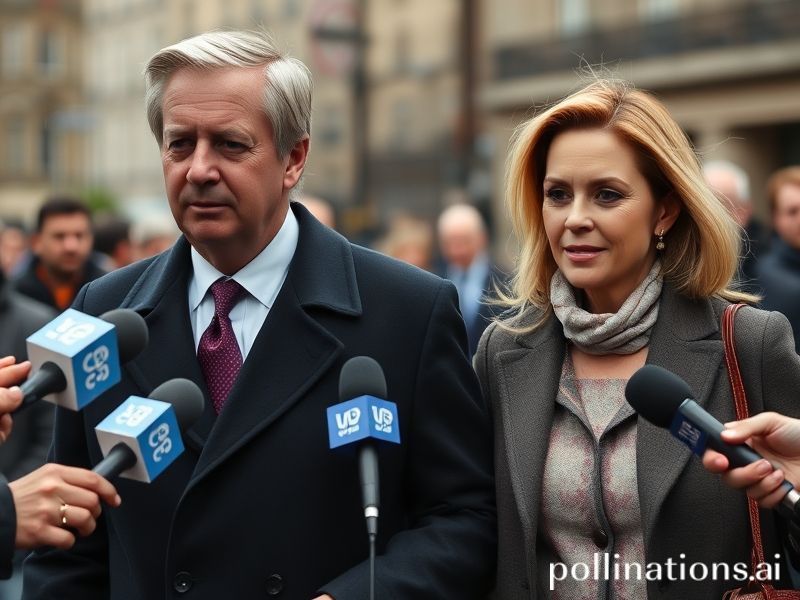Love in the Time of Brexit: How Nigel Farage’s French Romance Became Global Schadenfreude
In the grand, overheated circus of British politics, the phrase “Nigel Farage partner” does not, alas, refer to a plucky EU bureaucrat forced into an arranged fox-trot with the man who spent three decades trying to divorce her. Rather, it signals the latest curiosity from the international sideshow: the revelation that Farage’s long-time French partner, Laure Ferrari—once a Strasbourg waitress turned press attaché turned Ukip press attaché turned Brexit Party MEP—has been quietly sharing both pillow talk and WhatsApp groups with the self-styled scourge of Brussels.
To the uninitiated, this tidbit might read like gossip fit for the bottom rack of a provincial dentist’s waiting room. But step back and the optics are positively geopolitical. A British nationalist whose hobby is collecting European passports (he keeps the German one in a velvet pouch labelled “irony”) finds domestic bliss with a Frenchwoman who literally built her career inside the parliament he wants dynamited. Somewhere in Davos, a strategic-communications consultant just billed an extra hour for “narrative dissonance therapy.”
Across the Channel, Le Monde ran the story under the headline “L’amour sans frontières, sauf pour les migrants,” a line so deliciously acidic that even the Élysée’s sommelier paused mid-sip. Meanwhile, in Washington, the MAGA-to-English dictionary was hastily updated: “globalist” now apparently excludes spouses, provided they can pour a decent Sancerre. The Chinese internet, ever pragmatic, filed the romance under “soft-power asset acquisition” and moved on to stockpiling semiconductors.
The wider significance? We are witnessing the final commodification of Euroscepticism itself. Once a fringe grievance peddled in smoky pubs, Brexit has become a lifestyle brand complete with its own influencer couple. Think of them as the Beckhams of managed decline: he supplies the reheated Empire nostalgia, she lends Gallic chic that whispers, “Yes, we still holiday in Provence—tariff-free, thanks to a shell company in Luxembourg.” Together they offer a transnational masterclass in having gateau and eating it.
Financial markets, those finely tuned hysteria machines, reacted with the indifference of a cat discovering yesterday’s news. Sterling barely twitched; after all, traders long ago priced in the fact that Farage’s romantic CV is as volatile as his political one—rumor has it he once ghosted a Bavarian countess over disagreements on fish quotas. Still, analysts at Nomura issued a memo noting that any eventual wedding could shave 0.3 per cent off UK-EU trade if the canapés are sourced under WTO rules.
Further east, the Kremlin’s troll farms briefly spun the relationship as proof that Europe’s right-wing populists are “unserious cosplayers,” before remembering they’d once paid Farage to appear on RT and quietly deleted the tweet. In Brussels, officials adopted the diplomatic posture of an ex who spots their former nemesis holding hands with the intern: polite smile, slight shudder, discreet check of non-disclosure agreements.
And what of Laure Ferrari herself? Friends insist she is no trophy but a savvy operator who can navigate both the European Parliament’s Byzantine corridors and the even darker labyrinth of Farage’s ego. Insiders whisper that she keeps a laminated copy of Article 50 taped above the Nespresso machine—part motivational totem, part punchline. One can almost hear the late-night banter: “Mon chou, you storm out of the EU every day before breakfast; can’t you at least load the dishwasher?”
The moral, if morals still qualify as news, is that nationalism ages into a mid-life crisis like everything else. The same men who once railed against “foreign entanglements” now swipe right on them, so long as the accent is charming and the paperwork discreet. Farage may preach sovereign islands, but his heart, like cheap gin, travels exceptionally well.
Conclusion: In the end, “Nigel Farage partner” is less about two people than about the grand, slow-motion implosion of political certainty. The world watches, popcorn in hand, as the archetype of Little England discovers that even the stiffest upper lip eventually needs kissing. Somewhere, the ghost of Enoch Powell is updating his dating profile: “Must love dogs, deregulation, and continental breakfasts—irony strictly optional.”







